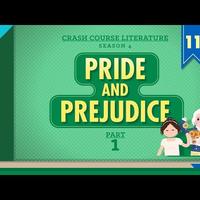Pride and Prejudice, Part 1: Crash Course Literature 411 - YouTube (2)
But the idea that happiness should be privileged over security is pretty radical.
/ Elizabeth is deciding that her personal individual
happiness should outweigh the economic problems of her family.
She is taking a huge risk when she rejects him.
/ As Mr. Collins tells her, she's poor so
she probably won't get another proposal.
He might not have made her happy, but he would have made her and any unmarried sisters financially
secure.
And then, Elizabeth takes the same risk or a greater one when she rejects Mr. Darcy's
insulting first proposal.
She can't make herself marry a man she doesn't like.
This was the same dilemma Austen herself faced and her rejection of a suitor made things
hard for herself and for her family.
But she did it anyway.
Now, thanks to the fairy tale ending, Elizabeth doesn't experience, like, catastrophic consequences
as a result of her privileging happiness.
/ But as 19th century English readers would
have been very well aware, she could have.
And so, the novel helped them, and also helps us, explore when we should put our own needs
first, and when the happiness and security of others is more important.
/ Is doing what is best for you always the right
thing to do?
Or are there moments when you must sacrifice your happiness for the good of your family
or your social order?
We'll continue our discussion next time when we'll also examine whether the politics
of the book are radical or conservative.
And we'll answer a vexing question: Why does Lydia buy such an ugly bonnet?
Thanks for watching.
Hope it was tolerable.
I'll see you next time.

